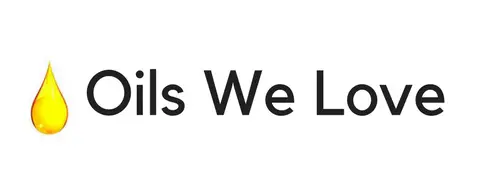Hair growth is an essential aspect of overall beauty and confidence for women. Many factors can impact hair growth, including genetics, age, and lifestyle choices. While there is no magic pill to instantly make your hair grow longer and thicker, certain vitamins can help support healthy hair growth. In this article, we will explore the science behind hair growth and highlight the best hair growth vitamins for women that can potentially enhance hair health.
Understanding Hair Growth
Before diving into the best vitamins for hair growth, it’s important to understand the basics of how hair grows. Hair growth occurs in three stages: anagen, catagen, and telogen. The anagen phase is the active phase in which the hair follicles produce new hair. During this phase, the cells in the hair follicles divide rapidly, pushing the hair shaft up and out of the scalp. The length of the anagen phase determines the length of the hair. The catagen phase is a transitional phase where hair growth stops. It lasts for a short period of time, during which the hair follicle shrinks and detaches from the dermal papilla. Finally, the telogen phase is the resting phase where the hair falls out. This phase lasts for about 2 to 3 months before a new hair begins to grow in its place.
The Science Behind Hair Growth
At the root of each hair follicle are tiny blood vessels called dermal papillae. These blood vessels deliver oxygen and nutrients to the hair follicles, promoting healthy hair growth. The dermal papilla contains a group of specialized cells that play a crucial role in hair growth. These cells are responsible for signaling the hair follicle to enter the anagen phase and produce new hair. The dermal papilla also contains stem cells that contribute to the regeneration of hair follicles.

- 2-Week anti-inflammatory meal plan.
- 45 Foods that Cause Inflammation
- 31 Things to Avoid on Food Labels
- Grocery Lists. Challenges. Symptoms Tracker
The hair growth cycle is influenced by numerous factors, such as hormones, diet, and overall health. Hormones, especially androgens like testosterone, can affect the length and thickness of hair. Imbalances in hormone levels can lead to hair loss or excessive hair growth. Diet also plays a significant role in hair growth. A diet rich in essential vitamins, minerals, and proteins provides the necessary building blocks for healthy hair. Additionally, overall health factors like stress and certain medical conditions can impact hair growth.
Factors Affecting Hair Growth in Women
Several factors can affect hair growth in women. Hormonal changes, such as those experienced during pregnancy or menopause, can disrupt the hair growth cycle. During pregnancy, hormonal fluctuations can cause an increase in the duration of the anagen phase, resulting in thicker and fuller hair. Conversely, hormonal changes during menopause can lead to hair thinning and slower growth.
Nutritional deficiencies, especially of essential vitamins, may also contribute to hair thinning and slow growth. Vitamins like biotin, vitamin D, and vitamin E are known to promote hair growth and maintain hair health. Iron deficiency can also lead to hair loss, as iron is essential for the production of red blood cells that carry oxygen to the hair follicles.
Additionally, stress can have a significant impact on hair health. Chronic stress can disrupt the hair growth cycle and lead to hair loss. Certain medications, such as those used for cancer treatment or hormonal imbalances, can also cause hair thinning or loss as a side effect. Furthermore, excessive hairstyling or heat treatments can damage the hair shaft and weaken the hair, leading to breakage and slower growth.
In conclusion, understanding the science behind hair growth and the factors that can affect it is crucial for maintaining healthy and vibrant hair. By addressing any underlying issues, such as hormonal imbalances or nutritional deficiencies, and adopting a hair care routine that promotes optimal hair health, individuals can support and enhance their natural hair growth.
5 Best Vitamins for Hair Growth
Vitamins play a crucial role in promoting healthy hair growth. They provide the necessary nutrients that nourish hair follicles and support their function. While a balanced diet is the best way to obtain these vitamins, supplementation can be beneficial for those with specific deficiencies or hair concerns. Let’s explore some essential vitamins for hair growth.
1. Vitamin A: This vitamin helps produce sebum, a natural oil that moisturizes the scalp and keeps hair healthy. It also aids in the growth and development of cells, including hair follicles.
Vitamin A is a fat-soluble vitamin that is essential for maintaining the health of your hair. It not only promotes the production of sebum, which keeps your scalp moisturized, but it also helps in the growth and development of cells, including hair follicles. A deficiency in vitamin A can lead to dry and brittle hair, as well as an itchy scalp.
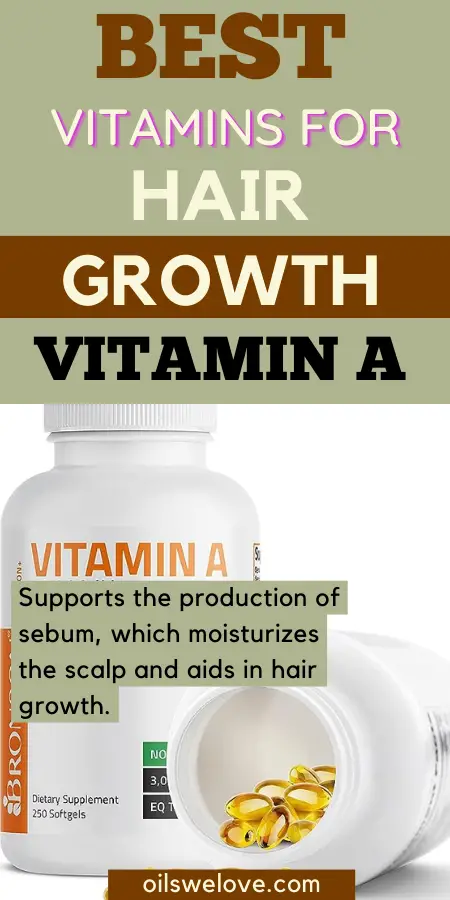
2. B-Vitamins: Biotin, niacin, and other B-vitamins are known to promote hair growth. They help create red blood cells, carry oxygen and nutrients to the scalp, and improve hair strength.
B-vitamins, such as biotin and niacin, are essential for healthy hair growth. Biotin helps in the production of keratin, a protein that makes up the structure of your hair. Niacin improves blood circulation to the scalp, ensuring that oxygen and nutrients are delivered to the hair follicles, promoting their growth. These vitamins also help in improving hair strength, making it less prone to breakage.
Vitamin B7 (Biotin): Supports the production of keratin, a key structural protein in hair.
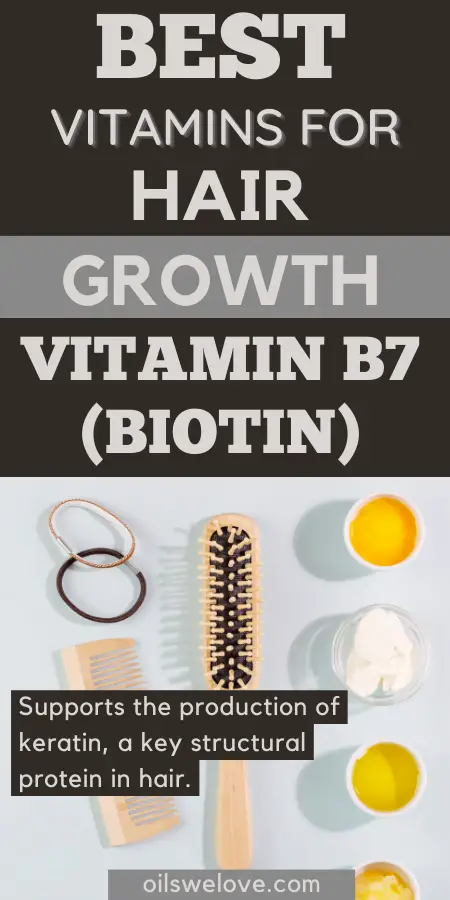
3. Vitamin B3 (Niacin): Enhances blood circulation to the scalp, promoting hair follicle health.
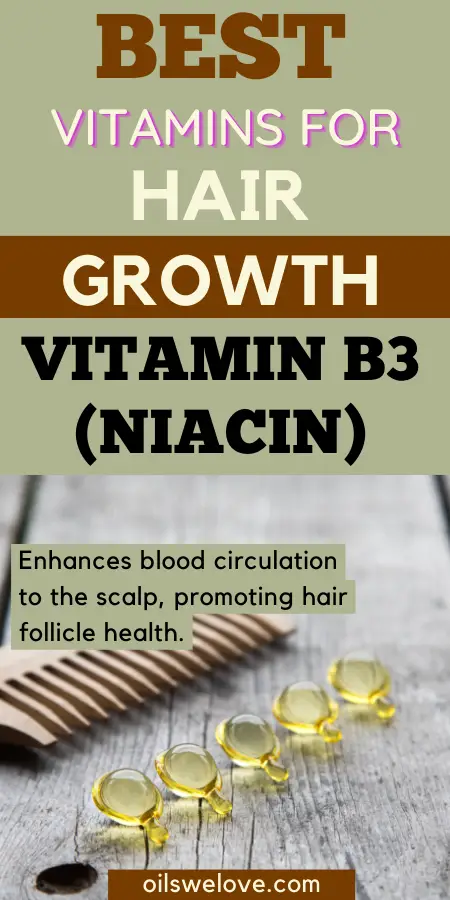
4. Vitamin B5 (Pantothenic Acid): Supports the metabolism of hair follicle cells, promoting hair growth.
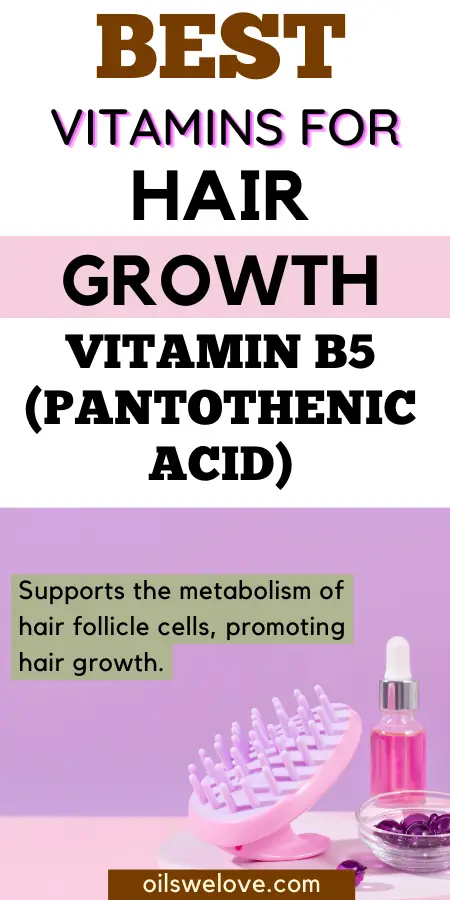
5. Vitamin B6 (Pyridoxine): Aids in the absorption of zinc, which is important for hair health.
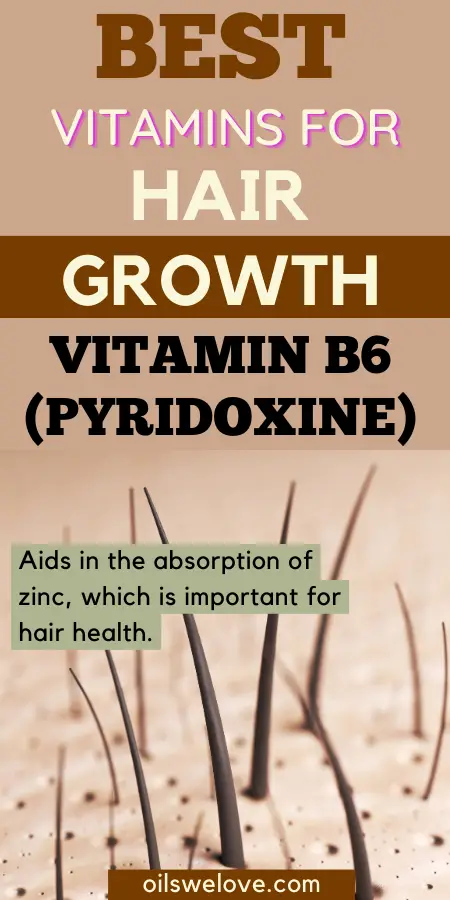
6. Vitamin C: This powerful antioxidant supports collagen production, a protein that strengthens hair strands. It also assists in iron absorption, which is crucial for healthy hair.
Vitamin C is not only important for boosting your immune system, but it also plays a significant role in maintaining healthy hair. It supports collagen production, a protein that helps in strengthening the hair strands, making them less prone to damage and breakage. Additionally, vitamin C assists in the absorption of iron, which is crucial for healthy hair growth. Iron deficiency can lead to hair loss, so ensuring an adequate intake of vitamin C can help prevent this.
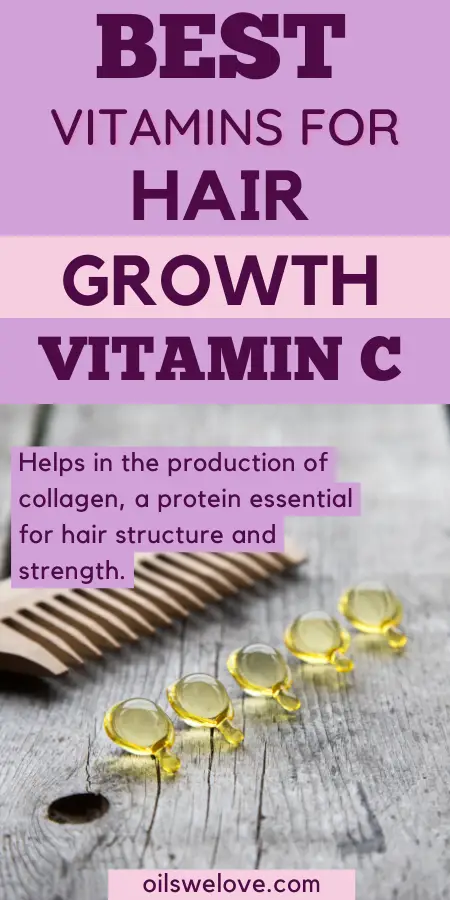
7. Vitamin D: Vitamin D plays a role in hair follicle cycling and can help prevent hair loss. It also aids in the absorption of other essential minerals, like calcium and zinc.
Vitamin D, often referred to as the “sunshine vitamin,” is not only essential for bone health but also plays a role in hair growth. It helps in the regulation of hair follicle cycling, promoting the growth of new hair strands. Vitamin D also aids in the absorption of other essential minerals, such as calcium and zinc, which are necessary for strong and healthy hair.
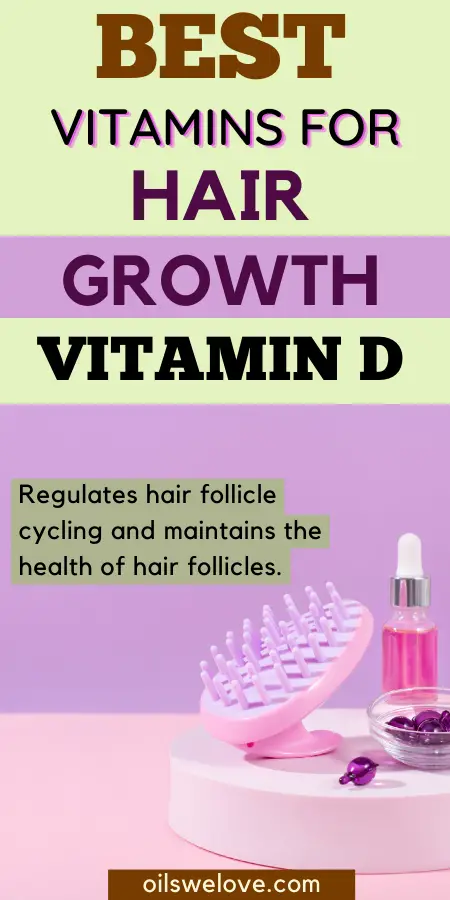
8. Vitamin E: Known for its antioxidant properties, vitamin E promotes a healthy scalp and enhances blood circulation, which is vital for hair growth.
Vitamin E is a powerful antioxidant that helps protect the scalp from oxidative stress caused by free radicals. It promotes a healthy scalp by reducing inflammation and improving blood circulation, which is essential for delivering oxygen and nutrients to the hair follicles. A healthy scalp provides the optimal environment for hair growth, making vitamin E an important nutrient for maintaining healthy and lustrous hair.
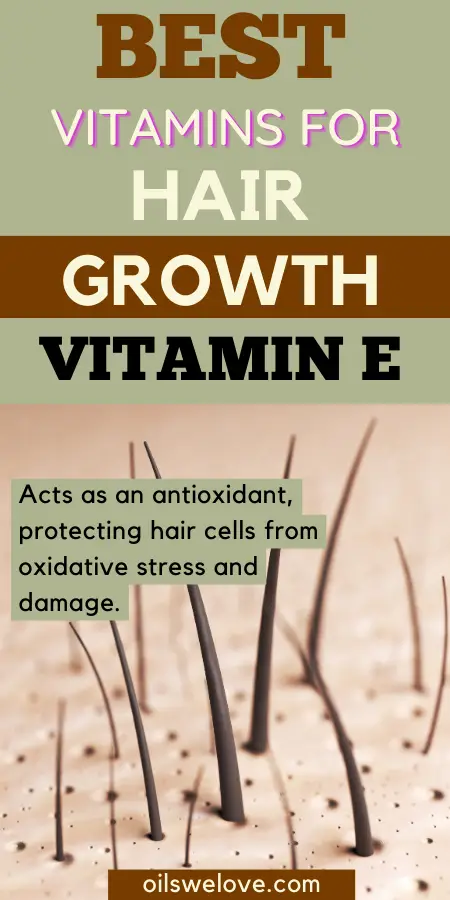
9. Vitamin B12: Essential for red blood cell production, which carries oxygen to hair follicles for growth.
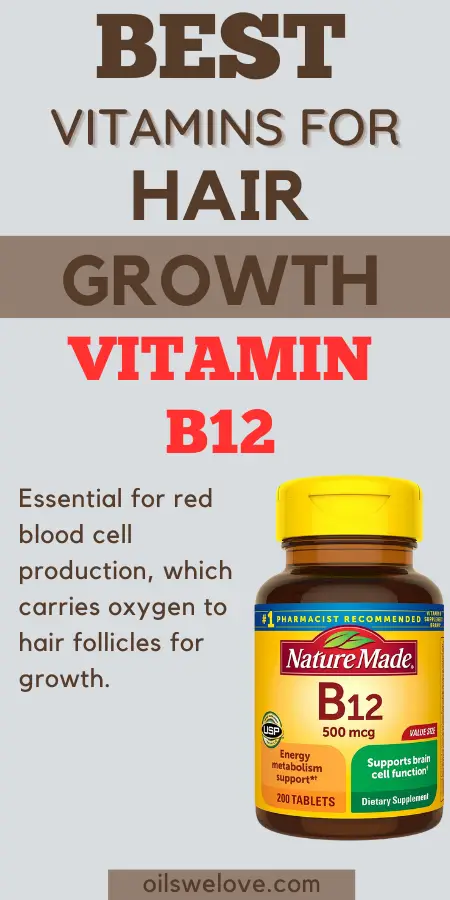
10. Folic Acid: Encourages cell division and tissue growth, including that of hair follicles.
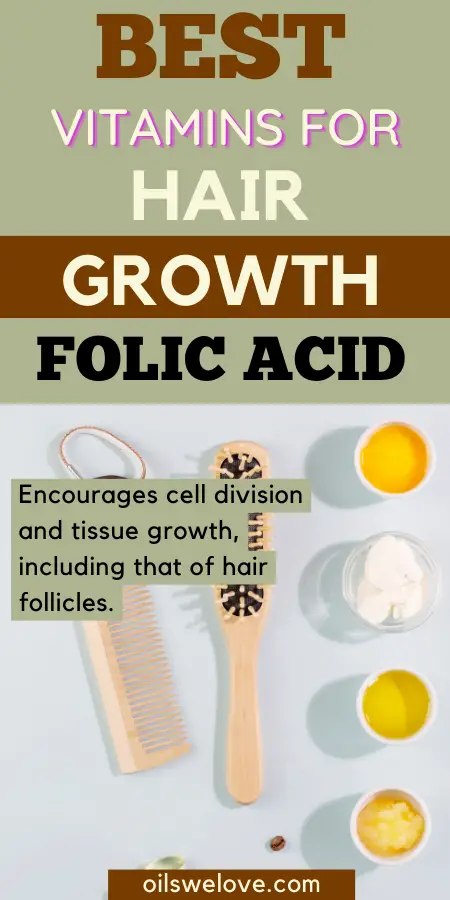
Top Foods for Hair Growth
Vitamin A: carrots, sweet potatoes, and spinach
Vitamin A can be found in abundance in foods like carrots, sweet potatoes, and spinach. However, excessive intake of vitamin A can be harmful, so it’s essential to consume it in moderation or consult with a healthcare professional for proper dosage.
B-Vitamins: whole grains, lentils, and leafy greens
B-vitamins are widely available in many foods, including whole grains, lentils, and leafy greens. However, incorporating a B-vitamin supplement formulated for hair growth into your routine may help ensure adequate intake.
Vitamin C: citrus fruits, strawberries, and bell peppers
Citrus fruits, strawberries, and bell peppers are excellent sources of vitamin C. Consuming these foods can boost your vitamin C intake and promote healthy hair growth.
Vitamin D: fatty fish, fortified dairy products
In addition to spending time outdoors, vitamin D can be obtained through fatty fish, fortified dairy products, and certain mushrooms. If you have limited sun exposure or suspect a deficiency, consider speaking with a healthcare professional.
Vitamin E: almonds, sunflower seeds, and avocados
Include vitamin E-rich foods like almonds, sunflower seeds, and avocados in your diet. Alternatively, you can explore hair supplements containing vitamin E to ensure a consistent intake.
While vitamins alone cannot guarantee Rapunzel-like hair, they play a vital role in supporting healthy hair growth. If you are concerned about hair health or experiencing hair thinning, incorporating the right vitamins into your diet or considering supplementation may be beneficial. Remember, maintaining a balanced diet, managing stress levels, and adopting a good hair care routine are equally important for optimal hair health.
